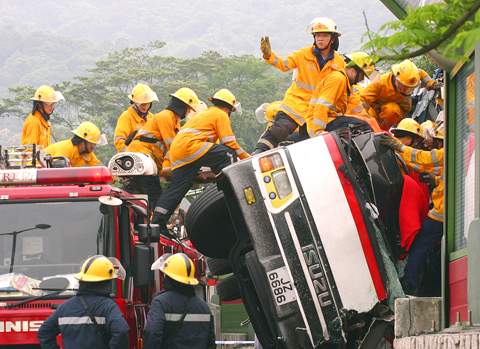An overcrowded tour bus lost control on a slope and flipped over yesterday in Hong Kong, killing 18 members of a local religious group and injuring 45 others. The driver was arrested on charges of dangerous driving.
After visiting the injured, Hong Kong Chief Executive Donald Tsang (曾蔭權) told reporters it was the city’s worst traffic accident in recent years.
A double-decker bus crash killed 21 people in 2003.

PHOTO: AP
Local TV reports from yesterday’s crash scene showed mostly elderly passengers covered in blood and wincing in pain as they were being pulled from the vehicle.
The battered bus’ windows were shattered, and it was leaning against a road barrier in the suburban district of Sai Kung.
“We’re still investigating the cause of the accident. We will look at whether it was due to speeding or whether there was anything wrong with the parts of the bus,” said Ho Chak-kan, acting police superintendent.
Ho said the driver was arrested and accused of dangerous driving that caused death. But Hong Kong Cable TV quoted the driver as saying the brakes failed before the accident.
The bus, with a maximum legal capacity of 55 people, was carrying 62 passengers on the religious group’s outing during the public May Day holiday, fire official Li Hung-sam told reporters.
Li said the roof of the bus collapsed after hitting a road barrier at a traffic circle and that hindered rescue efforts.
“Firemen had to climb inside the wreckage to save all the passengers. Inside the wreckage, all the passengers are trapped by the distorted seats,” Li said.
Most of the victims were critically injured, suffering head injuries, severe bleeding and broken bones, Li said. Most of those who died were women, he said.
The accident happened as the bus travelled from Kowloon to Hong Kong’s eastern New Territories, a seaside stretch that is heavily visited by tour groups on public holidays and weekends.

DENIAL: Pyongyang said a South Korean drone filmed unspecified areas in a North Korean border town, but Seoul said it did not operate drones on the dates it cited North Korea’s military accused South Korea of flying drones across the border between the nations this week, yesterday warning that the South would face consequences for its “unpardonable hysteria.” Seoul quickly denied the accusation, but the development is likely to further dim prospects for its efforts to restore ties with Pyongyang. North Korean forces used special electronic warfare assets on Sunday to bring down a South Korean drone flying over North Korea’s border town. The drone was equipped with two cameras that filmed unspecified areas, the General Staff of the North Korean People’s Army said in a statement. South Korea infiltrated another drone

COMMUNIST ALIGNMENT: To Lam wants to combine party chief and state presidency roles, with the decision resting on the election of 200 new party delegates next week Communist Party of Vietnam General Secretary To Lam is seeking to combine his party role with the state presidency, officials said, in a move that would align Vietnam’s political structure more closely to China’s, where President Xi Jinping (習近平) heads the party and state. Next week about 1,600 delegates are to gather in Hanoi to commence a week-long communist party congress, held every five years to select new leaders and set policy goals for the single-party state. Lam, 68, bade for both top positions at a party meeting last month, seeking initial party approval ahead of the congress, three people briefed by

Indonesia and Malaysia have become the first countries to block Grok, the artificial intelligence (AI) chatbot developed by Elon Musk’s xAI, after authorities said it was being misused to generate sexually explicit and nonconsensual images. The moves reflect growing global concern over generative AI tools that can produce realistic images, sound and text, while existing safeguards fail to prevent their abuse. The Grok chatbot, which is accessed through Musk’s social media platform X, has been criticized for generating manipulated images, including depictions of women in bikinis or sexually explicit poses, as well as images involving children. Regulators in the two Southeast Asian

ICE DISPUTE: The Trump administration has sought to paint Good as a ‘domestic terrorist,’ insisting that the agent who fatally shot her was acting in self-defense Thousands of demonstrators chanting the name of the woman killed by a US federal agent in Minneapolis, Minnesota, took to the city’s streets on Saturday, amid widespread anger at use of force in the immigration crackdown of US President Donald Trump. Organizers said more than 1,000 events were planned across the US under the slogan “ICE, Out for Good” — referring to the US Immigration and Customs Enforcement, which is drawing growing opposition over its execution of Trump’s effort at mass deportations. The slogan is also a reference to Renee Good, the 37-year-old mother shot dead on Wednesday in her